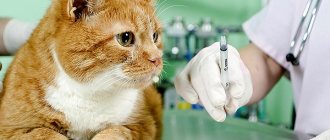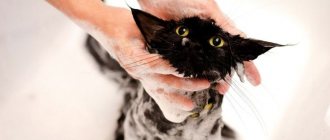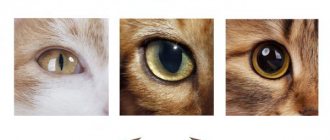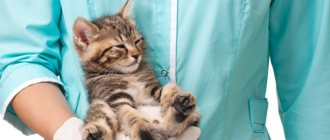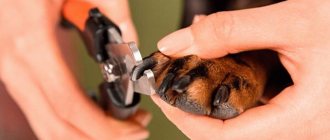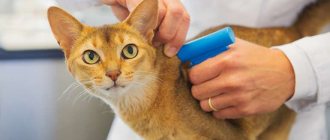What is deworming and why is it needed?
Deworming is measures aimed at destroying existing parasites or preventing their appearance. Worms are harmful not only to animals, but also to humans. For the safety of the whole family, it is important to prevent their appearance by all means.
For prevention purposes
Preventative treatment is carried out not only for those animals that constantly go outside, but also for couch potatoes. The likelihood of a pet becoming infected is lower, but it still exists. Risk factors include feeding with natural products, namely meat, fish and offal. Such food is often contaminated with parasites. The second source of danger is grass brought from the street.
Before vaccinations and travel
After vaccination, the immune system is weakened, since all its forces are aimed at fighting the introduced virus. A recently vaccinated animal is more vulnerable to helminths. Therefore, before vaccination, it must be dewormed.
Before going abroad, you will have to find out in advance how to properly deworm a cat. The mustachioed traveler will need a veterinary passport and veterinary certificate form No. 1. These documents contain notes on vaccinations and all anti-parasitic treatments. The certificate is issued on the basis of a veterinary passport, clinical examination, fluorescent diagnostics and the results of an analysis for helminths. Its validity period is only 5 days, so all necessary procedures are carried out in advance.
Pre-treatment will also be necessary for those who decide to go to the country. The likelihood of infection in nature is higher, and without additional protection, the pet runs the risk of acquiring parasites.
Deworming is mandatory for mature animals 2-4 weeks before mating. This is necessary to ensure that the expectant mother does not get helminthiasis - it is forbidden to treat a pregnant cat with almost all drugs. In addition, there is always a risk of infection of the offspring.
As a treatment
Infected pets are treated not once, but twice. The first time, anthelmintic drugs kill adult individuals, and the second time, they kill grown-up worms that have hatched from eggs.
Prevention
Helminthic infestation in animals is excluded by careful adherence to preventive measures:
- It is recommended to give antihelminthic drugs to your pet every 3 months. This will not cause harm to the animal’s body, because drugs are given in small doses.
- Meat and fish products should be excluded from the cat’s diet, and drinking water should be settled or boiled.
- It is recommended to protect your pet from contact with street animals.
- Regular treatment of the animal's sleeping place and its tray with special anti-worm products will protect your pet from parasites.
- It is recommended to regularly clean the room where the cat lives using chlorine-based products.
Preventative measures to protect a pregnant cat from helminths are important because... During this period, there is a high probability of intrauterine transmission of parasites to kittens.
Worming a cat is the main task of the owners in order to protect it from parasites, maintain the health of the offspring and ensure their full development. And in order to avoid the harm of deworming, the drugs must be chosen correctly and the instructions must be strictly followed.
All information posted on the site is provided in accordance with the User Agreement and is not a direct instruction to action. We strongly recommend that before using any product, you must obtain a face-to-face consultation at an accredited veterinary clinic.
When and how often to worm a cat
Calculating how to properly deworm a cat is quite easy. To do this, you need to understand the purpose of the event:
- Prevention
. If the pet is kept at home, then it is treated 2 times a year. If access to the street is not limited, then an anthelmintic is given every quarter.
- Treatment
. The anthelmintic is given twice with a break of 10-14 days. Remember that the anthelmintic does not affect eggs.
The schedule can be shifted when traveling abroad or outdoors, undergoing surgery or vaccination, as well as participating in exhibitions. To avoid complications, including overdose, be sure to listen to the advice of your veterinarian and follow the basic rules.
Deworming rules
Antihelmintics are given an hour before morning feeding. This eliminates the interaction with gastric juice of increased acidity observed during digestion. Neglecting this recommendation may impair absorption or change the properties of the medicinal substance.
Due to the toxicity of the drugs, only healthy animals are allowed for treatment. Anthelmintics should be given with extreme caution to kittens and pregnant and lactating pets.
The dosage of the medicine depends on the weight of the pet, so read the instructions before use. To be safe, consult your veterinarian. He may advise you to adjust general recommendations depending on the patient's condition. Here it is better to play it safe: too small a dose will not give the desired effect, and too much will lead to intoxication.
It is important to check for flea infestation before use. Fleas quickly spread worm eggs, preventing recovery. Until they are eliminated, treatment will be pointless.
To strengthen the immune system, prebiotics are given along with anthelmintics - dietary fiber that stimulates the growth of beneficial bacteria in the intestines. When carrying out a procedure for therapeutic purposes, be sure to get tested after repeated treatment and take care of more thorough hygiene of the tray.
Symptoms of worms in a kitten
Having settled in the cat’s body, the parasites begin to feed at the expense of the animal. As a result, the body loses nutrients and vitamins, which can lead to severe exhaustion and intoxication. To avoid this, it is important to pay attention to the well-being and health status of your pet in a timely manner. Common symptoms that are typical for any type of infestation may include:
- decreased appetite or excessive eating;
- digestive disorders with signs of vomiting, diarrhea and flatulence. There may be blood or mucus in the stool;
- intestinal obstruction due to extensive infection;
- unnaturally swollen belly;
- tendency to eat inedible objects such as paper, small stones, lime, soil;
- signs caused by vitamin deficiency and chronic intoxication: depression, exhaustion, dull coat and shedding;
- developmental delay compared to healthy kittens of the same age.
In some cases, other signs may appear:
- slight cough or chest wheezing;
- yellowness of the mucous membranes, enlarged liver;
- increased body temperature;
- itching or hives;
- lacrimation, conjunctivitis.
During the growth period, the kitten’s immune system is weakened and the body’s resistance is reduced, so the symptoms of helminthic infestation can manifest themselves clearly. The owner is advised to pay attention to changes in the general condition of his pet. This will allow you to identify symptoms of infection with endoparasites and contact a veterinarian in time to avoid serious or irreversible consequences.
Features of some groups of animals
Toxins in anthelmintics poison not only worms, but also the cat’s body. True, in the latter case, toxic substances do not have a significant effect. The danger arises only with low immunity, which is typical for sick animals and kittens. The drug will have to be taken with extreme caution during pregnancy and lactation, since all substances from the body are transferred to fragile babies.
In kittens
The first treatment of a kitten is carried out no earlier than three weeks of age. After this, it is processed quarterly, deviating from the schedule only before vaccination. Vaccinations are given starting from 2-3 months, followed by revaccination after 15-30 days. 10 days before vaccination, the baby is dewormed.
The selection of the drug and dosage is made by the veterinarian.
In pregnant and lactating females
Most anthelmintic drugs have a negative effect on embryos, causing abnormalities in their development and causing miscarriages. Veterinarians recommend treatment no later than 10 days before mating. This rids the pet of existing parasites in advance and gives her immunity from the appearance of new ones until the end of feeding.
If you are behind schedule, be sure to make an appointment at the veterinary clinic and find out how to deworm a pregnant cat. In the third trimester, taking medications is at its most dangerous, so it may be necessary to reduce the dosage indicated in the instructions.
Expectant mothers are given low-toxic anthelmintics: Drontal, Profender and Dirofen. The ban includes Polyvercan, Prazitel and Kanikquantel Plus. Their effect on the body is too aggressive and can lead to unpleasant consequences. In the absence of serious symptoms and maintaining good health, you can limit yourself to taking folk remedies.
With nursing pets, things are also not so simple. The first month of drug treatment should be avoided. When infected, babies are temporarily separated from their mother. In the second month after birth, you can take certain medications prescribed by your veterinarian.
How to deworm a cat: the best drugs
The best are considered to be anthelmintics that are age appropriate, easy to use, easy to dose, and do not cause side effects. When choosing drugs, reviews from consumers and veterinarians are taken into account.
They use medications that are produced in the following therapeutic forms:
- pills;
- oral suspensions;
- Spot-on drops;
- injectable drugs (rare).
The following antihelminthic medications are in demand:
- Bars Spot-on: applied to the withers of cats older than 8 weeks. Exterminates worms, fleas, subcutaneous ticks. Prevents infection with monthly use.
- Helminthal: drops for application to the back of animals weighing more than 1 kg. Destroys worms, including heartworms (nematodes that parasitize the heart), fleas, skin and subcutaneous ticks. Validity period: 6 weeks.
- Dironet: the suspension is administered orally using a dispenser syringe to a pet older than 3 weeks and weighing at least 0.5 kg, quarterly. Spot-on drops are applied to the back of animals monthly from 8 weeks.
- Dirofen tablets, paste and suspension are allowed for use from three weeks of age.
- Drontal is produced in tablets and is approved for use in cats weighing more than 1 kg.
- In-AP complex destroys fleas, ticks, worms, including heartworms. Apply to the withers of animals weighing more than 1 kg once every 6 weeks.
- Prazitel for cats is produced in the form of a suspension. The drug is approved for use from three weeks.
- Profender - drops on the withers of animals over 0.5 kg.
- Polyverkan are sugar cubes that a cat weighing more than 0.5 kg eats from the hand.
- Febtal tablets are intended for cats weighing more than 1.5 kg.
Be sure to read:
Worms in kittens: signs, symptoms and treatment
What drugs exist
Preparations intended for deworming cats come in narrow and broad spectrum. The former affect a specific type of parasite, while the latter affect several at once.
Thanks to the variety of release forms, the anthelmintic can be easily selected individually. It can be given in the form of tablets or suspensions, or simply dripped onto the withers. Each form has its own advantages and disadvantages. After reading them, you will understand how easier it is to deworm your cat.
Pills
The advantages of the tablet form are a longer shelf life and the possibility of localizing the action of the drug in a specific part of the gastrointestinal tract. This is achieved by applying a special coating that allows the active substance to be transported to the required location.
The downside of such medications is their slow action and the impossibility of use for frequent bouts of vomiting. The owners also have problems with feeding the tablets. Because of the bitter taste, animals often refuse to take them on their own, so the procedure is carried out forcibly.
Suspensions
First of all, suspensions are attractive due to their fast action. When the active substances are crushed, their surface area increases, allowing contact with a larger part of the organ or tissue infected with worms.
Another advantage is a more pleasant taste, which is achieved in production using flavoring agents. The taste of meat is accepted with a bang by mustachioed pets. Suspensions are often produced together with a dispenser syringe, which allows you to measure the required amount of medicine and inject it into the cat’s mouth.
If you have several pets, then treat them with one drug, choosing a convenient release form.
The disadvantages of suspensions include short service life and physical instability. The resulting sediment disrupts the uniformity of dosing.
Drops
Drops are applied only to the withers - a place that the animal cannot reach. To get the effect, just a couple of drops are enough, so owners choose this form because of its economical consumption and ease of use.
Swimming is excluded for 2 days before and after use. Water can wash away the protective barrier on the skin or the droplets themselves. In the first case, the pet will receive more toxins, and in the second, it will not feel the effect and will remain vulnerable to worms.
Please note that due to their gentle action, drops are not suitable for direct infestations. If helminthiasis is detected, it is recommended to use other anthelmintics, and the drops will act as a protective agent after getting rid of the worms.
Folk remedies
Traditional medicine is recommended for young people, pregnancy and lactation. It has no harmful effects on the body and is suitable even for weakened pets. Its only drawback is its slow action. Treatment will take from 7 to 30 days. There is also a risk of an allergic reaction.
To remove worms use:
- Infusion of wormwood and tansy. Grind the plants in equal proportions, pour boiling water over them and filter to remove small particles. For 1 tbsp. l. 250 ml of water is enough. The cooled infusion is taken an hour before morning feeding for 7 days.
- Pumpkin seed infusion. Pour boiling water over the peeled and crushed seeds, adding a little honey. After 12 hours, strain the infusion and serve half an hour before meals. The medicine can be given orally or through enemas.
- Tansy flowers. In addition to the green part, the buds themselves also have healing properties. Add peppermint, buckthorn bark and wild carrot seeds. Prepare the same way with tansy and wormwood, taking 2 times more herbal mixture. Give it three times a day for 3 days.
Before using folk remedies, be sure to consult your veterinarian. Some recipes may be dangerous.
It is strictly forbidden to use onions and garlic. These products contain chemicals that destroy feline red blood cells. Hemolytic anemia may be added to helminthiasis. Poisoning by these plants is accompanied by severe vomiting, diarrhea, pale mucous membranes and difficulty breathing.
How to give your cat medicine
Inexperienced owners often struggle trying to figure out how to deworm a cat that refuses medication. Not for the first time, spit out tablets gradually dissolve due to saliva, but still do not reach their destination. A frightened animal hides in the farthest corner and prevents any attempts to extract it from there.
This situation can be avoided if you think through everything in advance. The most important thing is to eliminate as much as possible all the exciting moments:
- Do not open medications in the presence of your pet. Measure out the required dose of tablet or suspension before the cat arrives.
- Wait for the right moment. It is easier to act in a state of rest or strong fascination with another object. Try gently waking your sleeping pet or giving him a pill when he persistently asks for food.
If you can’t do everything quickly, secure the cat on your lap with a blanket or towel, leaving only the head free. Gently open your jaws and place the tablet on the root of your tongue. After this, close your mouth and stroke your pet’s neck, provoking the swallowing reflex.
For the most aggressive and persistent, it is recommended to make a decoy by wrapping the tablet in a tasty piece of minced meat or cottage cheese. The medicine can also be crushed, mixed with water and served as a suspension.
A suspension or paste is more readily accepted by many animals, but there can be problems here too. If you are not yet comfortable with the deworming procedure, carry it out with the help of a second person. Later, you will learn how to quickly and deftly give your cat medicine.
How to properly deworm a cat yourself
If there are several cats in one room at once, then deworming is performed for all of them at the same time. Before the procedure, pets are checked for fleas. First you need to get rid of them. Fleas quickly transmit helminthic eggs. As a result, prevention and treatment are ineffective.
It is not recommended to select medications on your own. Especially if the cat has bloating, vomiting with foam, and parasite larvae are visible in the feces. These are signs of poisoning of the body with waste products of parasites. Incorrectly selected medications in this case can cause the death of the pet.
How to give your cat deworming tablets:
- The medicine must be prepared in advance so that the cat does not see it.
- Wrap your pet in a blanket or towel with one head sticking out.
- Take the cat by the head with your thumb and forefinger (cover your face with your palm). With your other hand, pull back the lower jaw.
- Place the tablet in your mouth (on the root of your tongue). Raise the head and hold it until the cat swallows the medicine. At the same time, stroke her throat, causing a swallowing reflex.
- The pet may try to spit out the tablet. Therefore, you need to hold the cat until the owner is sure that the medicine has been swallowed.
You can use other methods as well. For example, crush a tablet and add it to food. Stuff the pill into a meatball, a lump of cottage cheese or other delicacy. You can dissolve the tablet in water and put it into a syringe. Then fix the position as indicated above and pour the solution into the cheek.
Can deworming cause harm?
Complications can occur if the dosage is incorrect. An insufficient amount of the substance will keep the worms alive - they will continue to multiply and poison the body, which will affect the worsening of symptoms.
If kittens are overdosed or dewormed with adult medications, vomiting and diarrhea may occur. Gastrointestinal upset severely dehydrates the body, so animals will need the help of a veterinarian. Prolonged diarrhea in adult animals is safe for no more than 2 days, and in kittens – only 6-12 hours.
If you are hypersensitive to the active substances, itching or other allergic reactions, including anaphylactic shock, may occur. Other possible complications include:
- breathing problems (shortness of breath);
- blood pressure surges;
- excessive salivation and foaming (due to the bitterness of the medicine);
- stomach bleeding and kidney dysfunction;
- rapid weight loss.
In severe cases of helminthiasis and an excessively weakened body, taking anthelmintics can lead to multiple organ failure syndrome. This deadly pathology leads to rapid failure of all internal organs and systems. It is impossible to save an animal with such a diagnosis, so veterinarians recommend a full diagnosis before deworming in severe cases.
Causes of worm infection in kittens
For many owners, it is difficult to imagine that a small kitten, who is just beginning to explore the world around him, can be infected himself and be a carrier of worms. But this erroneous misconception is fraught with serious danger both for the feline itself and for all family members. Therefore, it is very important to know about possible routes of infection by endoparasites:
- intrauterine transmission of worms from a pregnant cat;
- contact with environmental objects, which may include water, infected animals (cats, mice, rats), grass in the yard;
- contact with contaminated (contaminated) objects, such as shoes, clothes, rugs in the hallway;
- feeding meat or fish products that have not passed veterinary control and have not been frozen or treated with boiling water;
- eating contaminated prepared food;
- the presence of fleas and lice eaters in the kitten, which are carriers of the larval form of the helminth;
